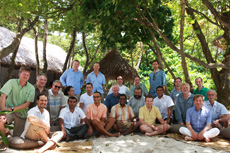The US diplomatic cables leaked by whistle-blowing website Wikileaks includes 3325 as-yet unreleased missives from the US Embassy in Colombo, making the Embassy in Sri Lanka among those hardest-hit by the scandal.
Wikileaks, in conjunction with several newspapers in the UK and Europe such as the Guardian, will stagger the release of 250,000 cables over the next few days. Today’s leak has already sparked diplomatic crisises all over the globe.
Correspondence already released includes urging by Saudi Arabian leaders for the US to attack Iran to disrupt its nuclear programme, while leaders in Saudi Arabia, Egypt and the United Arab Emirates described the country as “evil”, an “existential threat” and a power that “is going to take us to war”.
The Guardian’s newspaper’s report on the leaks noted that former president of the Jordianian senate, Zeid Rifai, had told “a senior US official” to “bomb Iran, or live with an Iranian bomb. Sanctions, carrots, incentives won’t matter.”
The leaked cables included allegations that Russian intelligence agencies were using mafia bosses to conduct criminal operations, with one cable claiming that the country was “virtually a mafia state.”
According to the Guardian’s report, the cables also identified “intense US suspicion” around the “extraordinarily close relationship” between Russia Prime Minister Vladimir Putin and Italian Prime Minister Silvio Berlusconi in relation to “lavish gifts”, “lucrative energy contracts” and “shadowy” contacts.
The cables identify Saudi Arabian donors as allegedly “the biggest financiers of terror groups”, and disclose an “extraordinarily detailed account” of plans to disguise the bombing of al-Quaeda targets with the assistance of countries such as Yemen.
Hacking attacks directed at Google, which prompted the search giant to leave China, were reportedly ordered by a senior member of the Chinese politburo after he typed his name into the popular search engine and found disparaging articles written about him.
One of the most controversial leaks concerns a directive requesting the specification of communications equipment and IT systems used by top UN officials and details “of private VIP networks used for official communication, to include upgrades, security measures, passwords, personal encryption keys.”
Maldives Foreign Minister Dr Ahmed Shaheed noted that former US President Richard Nixon had tapes of his conversations leaked in the early ’70s.
“Nixon used a few choice phrases to describe some close allies. It didn’t damage [international] relationships, but he may have upset some of the people he referred to,” Dr Shaheed said.
The correspondence includes 3325 as-yet unreleased cables from the US Embassy in Colombo, some of which may concern the Maldives.
Dr Shaheed told Minivan News that while he doubted the dispatches would be as sensational “as some people think”, “it will make the US uncomfortable when some of its confidential reports go public.
“However I don’t think it will damage US ties in this region because, by and large, this not central region for US diplomacy and they US has not been brokering difficult negotiations – what the US has been saying here it has been saying very publicly,” he added.
Dr Shaheed confirmed that the US Embassy in Colombo had notified the Maldivian government that the release of the cables was likely, “however they don’t know what the contents are or the areas they will [concern].”
Cultural Affairs Officer and Spokesperson for the US Embassy in Colombo, Glen Davis, told Minivan News that the US would not be commenting specifically on the contents of the leaked cables.
“Cable traffic is very preliminary; pieces are incomplete and read out of context, they are easy to misconstrue,” he said.
“A disclosure like this is bad for contacts, harmful to global engagement and makes it difficult to tackle problems such as organised crime and nuclear proliferation. Washington has taken very aggressive action to ensure the privacy of future communication is secure.”
Davis added that the US Embassy was “determined to keep doing what we’re doing, and reassure the people we work with. It’s hard to see [how the leak] will lead to constructive results.”
The UK High Commission in Colombo said it was official policy “not to comment on the substance of leaked documents.”
However, it condemned the “unauthorised release of this classified information, just as we condemn leaks of classified material in the UK. They can damage national security, are not in the national interest and, as the US have said, may put lives at risk. We have a very strong relationship with the US Government. That will continue.”
The diplomatic cables were drawn from the US government’s Secret Internet Protocol Router Network (SIPDIS), a separate US military-run internet that is accessible to approximately three million Americans. The US reportedly suspects that the leak originated from the same source as the Iraq and Afghan war logs, 22 year-old US soldier Private Bradley Manning, who was posted as a junior intelligence officer in Baghdad.
